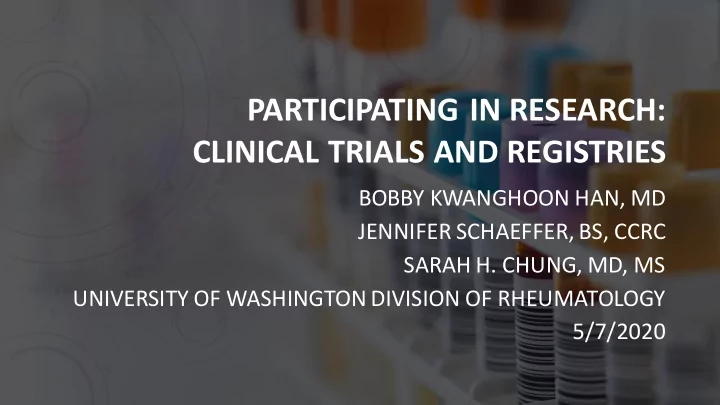

PARTICIPATING IN RESEARCH: CLINICAL TRIALS AND REGISTRIES BOBBY KWANGHOON HAN, MD JENNIFER SCHAEFFER, BS, CCRC SARAH H. CHUNG, MD, MS UNIVERSITY OF WASHINGTON DIVISION OF RHEUMATOLOGY 5/7/2020
TYPES OF RESEARCH IN RHEUMATOLOGY POPULATION CLINICAL QUALITATIVE TRANSLATIONAL BASIC SCIENCE ↔ Animal studies Epidemiology Experiential data Basic Science Clinical trials Disease mechanisms Large databases Patient-reported outcomes New intervention Clinical Care Associations/trends Survey data
WHAT IS TRANSLATIONAL RESEARCH? • Studies that take lab findings to clinical care • Studies that take clinical care to the lab
WHY IS TRANSLATIONAL RESEARCH IMPORTANT? • Using human samples to study conditions • Potential to provide more tailored clinical care • Keeps clinically-pertinent research questions at the forefront!
WHAT ARE POPULATION STUDIES? • Trends in disease outcomes • Factors that affect disease severity, outcomes, or delivery of care • Environmental or social exposures that are associated with disease states
WHY ARE POPULATION STUDIES IMPORTANT? • Increases our knowledge of the disease in real-life • Allows for understanding of diseases over time • Monitor the quality of care (quality improvement)
REGISTRIES AND BIOBANKS: WHAT’S THE DIFFERENCE? Registry : Information Biobank : Patient samples (blood, urine, tissue)
REGISTRIES AND BIOBANKS: WHAT’S THE COMMONALITY? Both allow for storage of information over time
• Patients choose to be part of a registry and have data collected on: • Initial diagnosis features • Labs or imaging findings • Medications • Surgeries or tests performed • Lifestyle Registry : Information • Family history
• Participants donate samples. • De-identified samples are kept in secured laboratories in large freezers • Accompanied by registry Biobank : Patient samples data (blood, urine, tissue)
TYPES OF RESEARCH IN RHEUMATOLOGY POPULATION CLINICAL QUALITATIVE TRANSLATIONAL BASIC SCIENCE ↔ Animal studies Epidemiology Experiential data Basic Science Clinical trials Disease mechanisms Large databases Patient-reported outcomes New intervention Clinical Care Associations/trends Survey data
WHAT IS A CLINICAL TRIAL? • A research study that prospectively evaluates the effects and value of intervention in human participants • A source of valuable information which contributes to advancement of medicine • Generate necessary data for determining whether a new medication is safe and effective by the Food and Drug Administration (FDA)
Estimate tolerability and Phase I characterize properties of a drug Evaluate the effect of the drug in Phase II CLINICAL TRIAL several different doses PHASES Phase III Assess clinical effectiveness and adverse effects of the drug Phase IV Obtain additional information after approval of the drug
BENEFITS AND RISKS OF CLINICAL TRIALS Benefits Risks ❖ Play an active role in your own health ❖ Unpleasant or serious side effects to care experimental treatment ❖ Gain access to new research ❖ Experimental treatment may not be treatments before they are widely effective for you available ❖ Some protocols can be time intensive ❖ Obtain expert medical care at leading (trips to the study site, more health care facilities during the trial treatments, hospital stays or complex ❖ Help others by contributing to medical dosage requirements) research
The eligibility of a participant is determined by inclusion and exclusion criteria An informed consent form is reviewed and signed, which describes all the CLINICAL TRIAL details of clinical trial PROCESS Participants are asked to visit the clinic according to the protocol and work closely with the research team Participants are closely monitored during the study period and report any new symptoms
TARGETED ANT NTI-RHEUMATIC THERAPIES
HOW TO GET INFORMATION ON PARTICIPATING IN RESEARCH • clinicaltrials.gov • Website of major medical centers • rheumatology.uw.edu/research/clinical-trials • Arthritis Foundation
TO LEARN MORE ABOUT THE UW DIVISION OF RHEUMATOLOGY’S COMMITMENT TO RESEARCH, PATIENT CARE AND EDUCATION VISIT OUR WEBSITE AT WWW.RHEUMATOLOGY.UW.EDU THANK YOU!
Recommend
More recommend